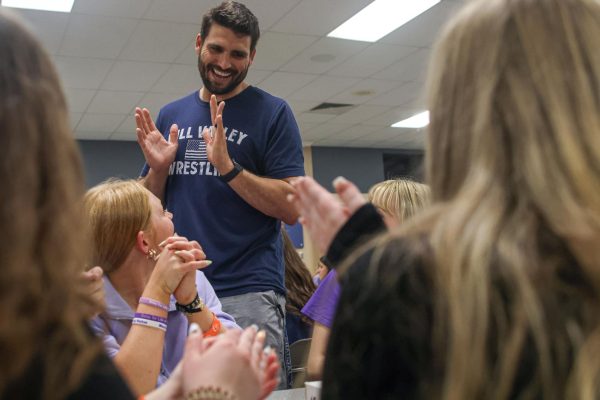Board of Education studies scheduling methods
District compares block and traditional scheduling in study
Guiding his AP US History class, social studies teacher Jeff Wieland favors block scheduling because it allows maximum time for rigorous courses. “[I prefer] block scheduling. I think that it is more conducive to the kind of lessons we should be teaching under the college and career ready standards,” Wieland said.
The results of a recent study comparing block and traditional scheduling requested by the Board of Education showed benefits for both schedules.
Under the current block scheduling system, students have half their classes on one day and the other half on the next day, with a seminar class at the end of every day. These classes are taught in 83 minute class periods. In traditional scheduling, students have all their classes on the same day, so the class periods are significantly shorter.
After a request by Board of Education member Scott Hancock, director of human resources Lachelle Sigg and director of teaching and learning Dr. Jessica Dain conducted a study comparing block scheduling and traditional scheduling. The study showed many benefits of block scheduling, including potential for more course variety and more depth within content.
According to the study, traditional scheduling would cause problems among both students and staff members, such as less time for content and plan time for teachers. Traditional scheduling was found to have the potential to cost less due to the fact that fewer staff members may be needed with less periods in the day.
“In general, a schedule that requires fewer teachers will result in financial cost savings to the school district,” Sigg said via email. “That said, our review of this matter also indicates that there are many benefits for students and staff when operating on a block schedule.”
Math teacher Lindsey Wiegele has taught with a modified block schedule at a previous school. She said that switching to traditional scheduling would greatly affect her classes.
“I wouldn’t be able to teach as much,” Wiegele said. “More time would be taken to start and end class with housekeeping.”
Social studies teacher Jeff Wieland has also taught using a traditional schedule and said that having traditional scheduling would conflict with new course standards.
“It would make it much harder to teach the college and career readiness standards,” Wieland said. “Those activities necessarily require more uninterrupted time.”
Sophomore Katie Lee said she likes block scheduling more.
“[With block scheduling] you get an extra day to do your homework,” Lee said. “I don’t think I would be able to keep up with tests [with traditional scheduling.]”
Freshman Joel Donn said studying would also be affected due to students having each class every day.
“[With block scheduling,] you’d have to study more because … you get more content [each day,]” Donn said.
After teaching with both systems, world languages teacher Jan Good-Bollinger said traditional scheduling might help with her courses.
“In terms of world languages … there’s probably some value in having class each day because you get more exposure,” Good-Bollinger said.
Although this may be true, freshman Brady Timmons said he prefers block scheduling when given a choice.
“I like it a lot,” Timmons said. “Now you don’t feel so rushed trying to pack everything in.”
After experiencing both, Wieland sees more value in block scheduling.
“I have done both and I prefer block scheduling,” Wieland said. “[It is a] more efficient use of time.”
Sigg said the Board will decide if it is necessary for the district to consider discussing this issue.
“[I am] not currently aware of what steps will be taken next with regard to this report,” Sigg said. “Ultimately the Board will determine if this matter becomes an issue for discussion and/or action by the Board of Education.”



![Guiding his AP US History class, social studies teacher Jeff Wieland favors block scheduling because it allows maximum time for rigorous courses. “[I prefer] block scheduling. I think that it is more conducive to the kind of lessons we should be teaching under the college and career ready standards,” Wieland said.](https://www.mvnews.org/wp-content/uploads/2013/11/weilandwebcrop.jpg)






